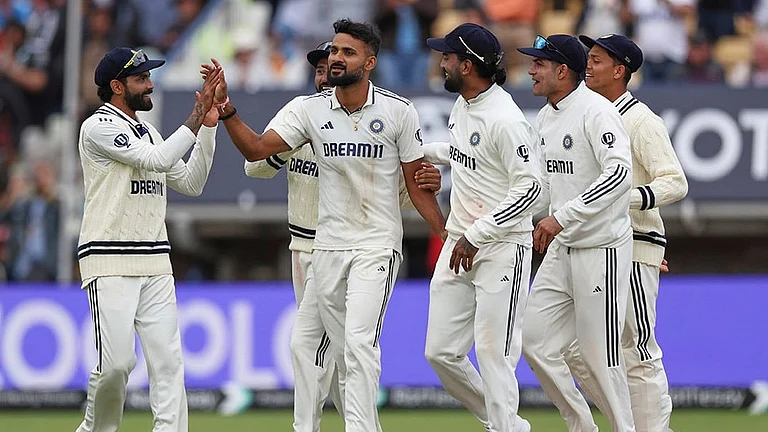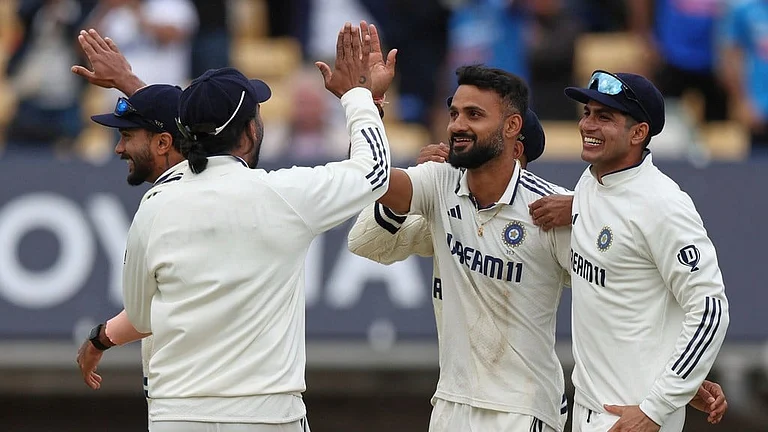It has taken India 35 long years to clear an old debt against England, but it couldn’t have come at a better time and in a more emphatic manner. In only his second Test match as captain, young Shubman Gill theatrically bowed deeper and deeper each time to the Edgbaston crowd, as he celebrated the passage of significant personal batting milestones. It started in the first innings with a fighting hundred that went on to become a double hundred and subsequently an epic 250-plus score.
IND Vs ENG Analysis: How Shubman Gill's Young India Came Of Age In Edgbaston Test
While Shubman Gill spectacularly shut up all those doubting his overseas batting credentials and captaincy abilities, the Indian new-ball attack of Akash Deep and Mohammed Siraj excelled in Birmingham amid Jasprit Bumrah's absence
He followed it up with a hundred in the second, that quickly turned into a 150-plus score, as his team made no mistake about batting England out of the match this time. And in the process, India repaid England in full measure, for their then skipper Graham Gooch’s triple century followed by a hundred in the first Test at Lord’s on the 1990 tour.
It continues to stand as a record since 35 years for the most number of runs scored by a batter in a single Test. Gooch’s record survived the charge of the young India captain, but only just.
Not since the legendary Vinoo Mankad in the famous ‘Mankad’s Match’ of the 1952 tour, has an Indian batter dominated the bowling to this extent in the two innings of a Test match in England. Mankad had of course, also taken a fifer in that match with the ball. Gill did not need to, as he had two skillful fast bowlers to do the job for him, as his side waltzed to a famous victory.
There were some doubts before the start of the series, on whether Gill should not have been given more time to fully establish his batting credentials before taking on the additional pressures of captaincy.
The way in which he has shut them all up for good with his brilliant batting has been unbelievable. And his first win in only his second Test match as captain seems to mark the beginning of what promises to be a long and satisfying era of Indian success under him.
The man literally revels in the pressure of captaincy!
The image that stood out on the fourth afternoon was one of Rishabh Pant’s bat going flying, high out of the frame for a third time in the day, as he tried to hit Shoaib Bashir out of the ground. He had ended up on his back just the previous ball as he scooped Bashir to the long leg fence over the fielder’s head. This one was miscued and duly caught.
It was almost as if he was bored by the methodical correctness of conventional Test cricket and wanted to do something outrageous for a change. The crowd loved it.
India of course were already 409 runs ahead at the time with seven second-innings wickets in hand and Pant could well afford the luxury of a wry smile as Brydon Carse handed his bat back to him, as he walked back.
He had just tossed away a possible third hundred in his fourth innings of this series. But then he is no stranger to missed Test match hundreds, having got out seven times in the 90s in his red-ball international career till date. And it is almost as if it doesn’t bother him that he could have been sitting atop a tally 15 Test hundreds by now after 45 matches, if he had converted those 90s into hundreds.
Rare English Run-Feast
Two “run-drenched Test matches”, as the commentary team described it, featured 1600-plus runs in the first game followed by nearly 1700 in this one with India contributing more than 1000 of them. The tally was almost unthinkable in usual English conditions marked by green pitches and rain delays and low cloud cover, offset by the switching on of floodlights, interspersed with the odd spells of brilliant sunshine in between. Conditions where 275-300 is par for the course as a good first-innings score.
But then these matches have been played over dry, hot, sunny days, in almost ‘un- English’ conditions, so to say, where the bat has relentlessly dominated the ball. The next game at Lord’s, however may well see a return to conventional English conditions.
Mohammad Siraj’s return to form, as he found the right length and bowled a probing, ‘corridor of uncertainty’ line, backed up by Akash Deep’s ability to find disconcerting movement with the new ball both in the air and off the wicket, saw the England top-order tottering and losing half the side for less than a hundred runs in both innings.
A brilliant, counter-attacking 303-run sixth-wicket partnership between Harry Brook and Jamie Smith rescued them to a large extent, taking the hosts to a comfortable 387 for 6 before the Akash-Siraj combo returned to wipe out the England tail as five wickets fell for 20 runs. Much like what had happened to India in the first Test.
Earlier, Gill and Ravindra Jadeja had done the same thing for India with their 203-run sixth wicket partnership in the first innings with Jadeja falling 11 tantalizing runs short of what could have been a second hundred in as many Tests at Edgbaston for him.
Akash Deep Rises From Wilderness
When India bowled, Akash looked so much like a young Mohammed Shami with his ability to make the ball wobble uncomfortably late for batters committed to their shots. He had done it in the first innings and he was doing it again with a vengeance in the second.
He had demonstrated this ability even in India on his debut series against England at Ranchi last year, as he ran through the England top order like a dose of salts.
And yet, he has generally been meandering in the wilderness since, and only featured in this playing XI as a third-choice replacement, after the first two failed to make an impression.
Much like Jofra Archer for England, who carried out the drinks on to the field. Strange indeed are the mysterious ways of selectors.
After his brilliant double century in the first innings, Gill looked rock-solid again in the second, cruising to a fluent hundred as he teamed up with Pant in a quick-fire century partnership, matching him stroke for stroke. And when England tried to pepper him with him bouncers, Gill hooked and pulled with calm authority and assurance.
Supplemented as always by the peerless front-foot driving that has been such a hallmark of his and KL Rahul’s batting in this series.
After India declared, England lost their third wicket just before close of play on the fourth evening, Joe Root bowled by Akash with an absolute beauty. Seldom if ever, has Root, the man with 36 Test hundreds and over 13,000 Test runs behind him, got into such a tangle. The 28-year-old seamer went wide of the crease and angled in a delivery that straightened on pitching, opening Root up as it went through his defence and clipped the top of the stumps. Suddenly the wicket wasn’t looking so flat anymore.
Siraj was brilliant too, with a 6-fer in the first innings and his rapid dismissal of Zak Crawley in the second, but it was Akash with his incisive new-ball bowling, who transformed this Indian attack, lending it an exciting cutting edge that had been missing hitherto. He had suddenly made the impossible look possible for India.
And for once, there would be no last-day heroics for Bazball.
When Day 5 finally began after a rain delay, Akash was quickly into a lethal groove again as he cleaned up Ollie Pope with one that came in to him and then caught the dangerous Harry Brook plumb in front, with one that nipped back sharply into him, in a classic English breakback.
He skillfully exploited the fifth-day cracks that had appeared in an otherwise flat wicket and looked unplayable at times. Brook would surely testify to that, as he left shaking his head in disbelief.
Between the two of them, Siraj and Akash had taken all 15 England wickets to have fallen up to that point. Till Washington Sundar drifted an arm ball into Ben Stokes’ pad on the stroke of lunch, somewhat against the run of play, as England lost their sixth wicket at 153 for 6.
Jamie Smith played another brilliant counter-attacking innings, his second of the match, to hold off India for a while. But gradually Jadeja and Prasidh Krishna also picked up a wicket each before Akash returned to claim two more and finish with a magnificent 6 for 99, which included his first fifer in Test cricket and a much-deserved ten-wicket haul in the match, as England folded up for 271.
Leaving India victors by an emphatic 336 runs and the series squared, as they go to Lord’s with a superbly dominant performance behind them. One that will be long remembered as the coming-of-age Test match of the Shubman Gill captaincy era.
One that also marked the emergence of Akash, who breathed new life into a tired India bowling attack.
The views and opinions expressed are those of the author. The author is a veteran Wing Commander of the Indian Air Force, who has played Ranji Trophy for Services.
Tags

